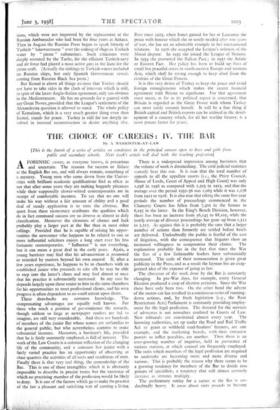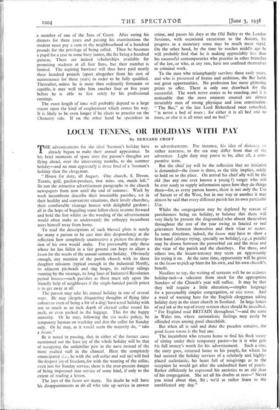THE CHOICE OF CAREERS : IV. THE BAR
By A BARRISTER-AT-LAW
[This is the fourth of a series of articles on conditions in the principal careers open to boys and girls from public and secondary schools. Next week's article will deal with the teaching profession] AFORENSIC career, as everyone knows, is precarious and uncertain. The reasons for success or failure at the English Bar are, and will always remain, something of a mystery. Young men who come down from the Univer- sities with brilliant academic qualifications find as often as not that after some years they are making beggarly pittances while their supposedly slower-witted contemporaries are in receipt of comfortable incomes. To say that no one will make his way without a fair amount of ability and a good deal of steady .application is to state the obvious. But apart from these elementary attributes the qualities which do in fact command success are so diverse as almost to defy classification. Moreover the elements of chance and luck probably play a larger part at the Bar than in most other callings. Provided that he is capable of seizing his oppor- tunities the newcomer who happens to be related to one or more influential solicitors enjoys a long start ever his less fortunate contemporaries. " Influence " is not everything, but it can mean a great deal in the early years. Again, a young barrister may find that his advancement is promoted or retarded by matters beyond his own control. If, after a few years experience, he happens to be in chambers with an established junior who proceeds to take silk he may be able to step into the latter's shoes and may find almost at once that his practice is substantially increased. In any case he depends largely upon those senior to him in the same chambers for his opportunities to meet professional clients, and his own progress is often dependent to no small extent upon theirs.
These drawbacks are common knowledge. The compensating advantages are equally well known. For those who reach a position of pre-eminence the rewards, though seldom so large as newspaper readers are led to imagine, are still very considerable. And there are hundreds of members of the junior Bar whose names are unfamiliar to the general public, but who nevertheless contrive to make substantial incomes. Moreover, a barrister's life, provided that he is fairly constantly employed, is full of interest. The work of the Law Courts is a constant reflection of the changing life of the community, and a common law junior with a fairly varied practice has an opportunity of observing at close quarters the activities of all sorts and conditions of men. Finally there is that very real thing, the comradeship of the Bar. This is one of those intangibles which it is obviously impossible to describe in precise terms -but the existence of which no practising member of the profession would be likely to deny. It is one of-the factors which go to make the practice of the law a pleasant and satisfying way of earning a living. There is a widespread impression among barristers that the volume of work is diminishing. The civil judicial statistics scarcely bear this out. It is true that the total number of appeals to all the appellate courts (i.e., the Privy Council, House of Lords, Court of Appeal and High Court) was only 1,038 in 1936 as compared with 1,503 in 1913, and that the average over the period 1932-36 was 1,063 while it was 1,278 from 1912 to 1916. It is also true that taking the same five-year periods the number of proceedings commenced in the Chancery Courts has fallen from 7,402 in the former to 6,195 in the latter. In the King's Bench Division, however, there has been an increase from 56,143 to 88,105, while the yearly average of divorce proceedings has gone up from 1,312 to 5,215. As against this it is probably the case that a larger number of actions than formerly are settled before briefs are delivered. Undoubtedly the public is fearful of the cost of litigation, with the consequence that litigants show an increased willingness to compromise their claims. The explanation probably lies in the fact that since the War the fees of a few fashionable leaders have substantially increased. The scale of their remuneration is given great publicity in the Press, and as a result the layman has an exag- gerated idea of the expense of going to law.
The character of the work done by the Bar is constantly changing. In pre-War days, for example, every General Election produced a crop of election petitions. Since the War there have only been two. On the other hand the advent of the motor-car has resulted in a continuous series of running- down actions, and, by fresh legislation (e.g., the Rent Restrictions Acts) Parliament is constantly providing employ- ment for the legal profession. The demand for the services of advocates is not nowadays confined to Courts of Law. New tribunals are constituted almost every year. The licensing authorities, set up under the Road and Rail Traffic Act to grant or withhold road-hauliers' licences, arc one example, and the marketing boards, with their extensive powers to inflict penalties, are another. Then there is an ever-growing number of inquiries, held in pursuance of various statutes, at which counsel are frequently employed. The tasks which members of the legal profession are required to undertake are becoming more and more diverse and various. This is probably the reason why there seems to be a growing tendency for members of the Bar to divide into groups of specialists, a tendency that will almost certainly increase as statutes multiply.
The preliminary outlay for a career at the Bar is un- doubtedly heavy. It costs about sixty pounds to become a member of one of the Inns of Court. After eating his dinners for three years and passing his examinations the student must pay a sum in the neighbourhood of a hundred pounds for the privilege of being called. Then be becomes a pupil for a year to some busy junior, the fee being a hundred guineas. There are indeed scholarships available for promising students at all four Inns, but their number is limited. The aspiring barrister will thus have paid nearly three hundred pounds (apart altogether from his cost of maintenance for three years) in order to be fully qualified. Thereafter, unless he is more than ordinarily fortunate or capable, it may well take him another four or five years before he is able to live solely by his professional earnings.
The exact length of time will probably depend to a large extent upon the kind of employment which comes his way. It is likely to be even longer if he elects to practise on the Chancery side. If on the other hand he specialises in crime, and passes his days at the Old Bailey or the London Sessions, with occasional excursions to the Assizes, his progress in a monetary sense may be much more rapid. On the other hand, by the time he reaches middle age he will probably find that he is making appreciably less than his successful contemporaries who practise in other branches of the law, or who, at any rate, have not confined themselves to criminal work.
To the man who triumphantly survives these early years, and who is possessed of brains and ambition, the Bar holds out great opportunities. No profession has more glittering prizes to offer. There is only one drawback for the successful. The work never ceases to be exacting, and it is noticeable that the most eminent counsel are almost invariably men of strong physique and iron constitution. " The Bar," as the late Lord Birkenhead once remarked, " is never a bed of roses ; for either it is all bed and no roses, or else it is all roses and no bed."



















































 Previous page
Previous page